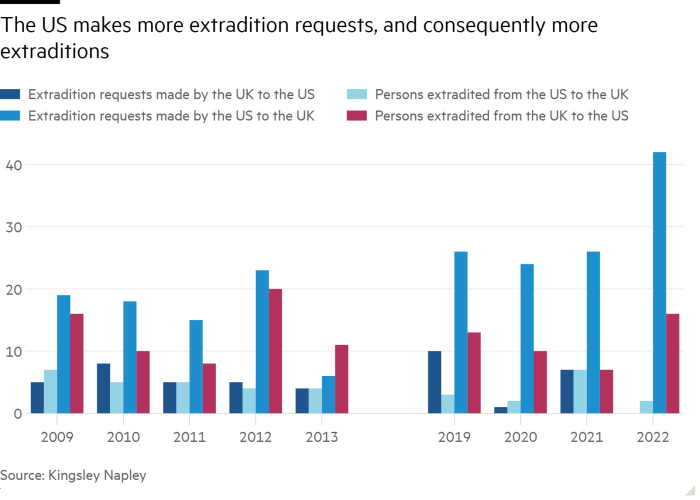
Unlock the US Election Countdown newsletter for free
The stories that matter on money and politics in the race for the White House
Mike Lynch, once considered one of Britain’s leading tech entrepreneurs, was acquitted of fraud by a US jury on Thursday. Around a third of his 12-year legal battle was spent fighting extradition to America.
Critics say the current extradition arrangements are “desperately unfair”, allowing UK citizens to be shipped to the US to face trial far too easily.
The reality, built up through years of legal rulings and legislative tweaks, is more complicated.
What is the US-UK extradition treaty?
A 2003 treaty allows the US and UK to extradite each others’ citizens.
The deal was part of an overhaul of the way the UK deals with terror suspects, in the wake of the 9/11 attacks in 2001, and aimed to speed up a process that had been considered slow and cumbersome.
Under the current extradition arrangement, the US does not have to present “prima facie” evidence of guilt when making an extradition request. This is in contrast to other nations, such as India, which have to present more comprehensive information before a request can be granted.
Why is it being criticised?
High-profile cases such as Lynch’s trial have fuelled the criticisms, including claims that British citizens should be prosecuted in their home country rather than sent overseas.
There are also concerns that while more UK residents are shipped to America for trial, fewer from the US come to face charges in Britain.
Between 2009 and 2022, almost three times as many UK citizens were sent to the US for trial than travelled the other way.

The case of a UK teenager killed in a road accident in 2019 by American citizen Anne Sacoolas — the wife of a US diplomat — particularly inflamed tensions, after she claimed diplomatic immunity to avoid extradition.
She was eventually sentenced remotely by a UK court while still in the US, and laws around the status of diplomats have since been changed.
“It’s easy meat for them [the US] to prosecute a foreigner,” former Conservative cabinet minster David Davis told the Financial Times on Friday. A longtime campaigner on civil liberties, he said the current system was a “desperately unfair mechanism”.
Does the agreement favour the US?
While on paper there are some variations in the language used by the two countries, legal experts have concluded that the differences are negligible.
A 2011 UK government-ordered review of the legislation by an independent group of lawyers found that the current treaty “does not operate in an unbalanced manner”.
In fact, on one measure, the UK is more successful. According to data from 2009-22 compiled by law firm Kingsley Napley, around 85 per cent of the UK’s extradition requests were granted, compared to just 56 per cent for the US.
The difference is that the US makes a far higher number of requests: 199 applications between 2009 and 2022, compared to fewer than 50 from the UK.
Why are more UK citizens sent abroad?
The key difference is not the law in the two countries, but each nation’s relative appetite to pursue those overseas that are considered to be criminals.
The US is more aggressive in prosecuting foreigners and has more tools, such as plea bargains, to strong-arm people into co-operating, according to several prominent English extradition lawyers.
“The US is just more aggressive at pursuing people overseas,” said Nick Vamos, a lawyer at Peters & Peters and the former head of extradition at the Crown Prosecution Service for England and Wales.
“When they [the US and UK] are both interested in the same person, often the result is ‘well the US are more advanced and so we’ll let them proceed’.”
Has anything changed?
In 2013, the UK brought in a rule that allowed courts to block an extradition if a significant amount of the alleged misconduct took place in the UK, and a judge decides extradition would not be in the interests of justice.
Called the “forum bar” test, it has been used several times.
In 2018 two prominent defendants — Lauri Love, a UK computer activist accused of hacking into US government computers and stealing data, and Stuart Scott, a former HSBC foreign-exchange trader — avoided being sent overseas for trial using this test.
Following Lynch’s acquittal, the debate has also risen again over whether the US should be required to submit more evidence with its applications.
“Lynch’s case may reinvigorate the argument that a prima facie test should be applied to all US requests for extradition so that they [the UK courts] are satisfied there is a case to answer before an individual is sent across the Atlantic,” said Edward Grange, a London extradition lawyer at Corker Binning.
“However, I think a shift on this is unlikely given the evolution of extradition law away from a system that potentially undermines the mutual trust and confidence between states that have strong diplomatic ties.”